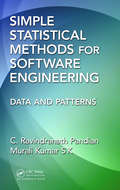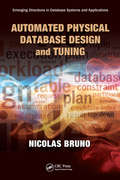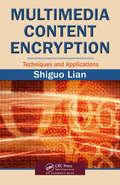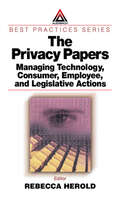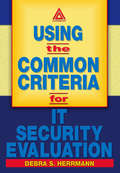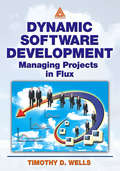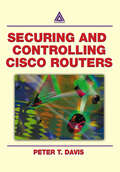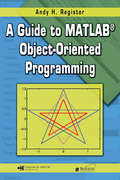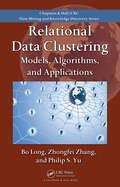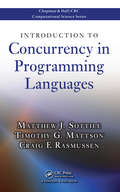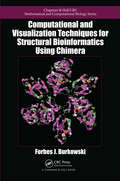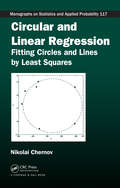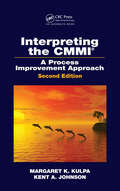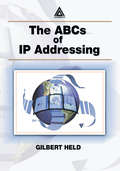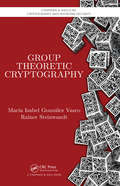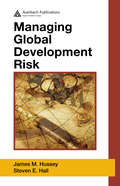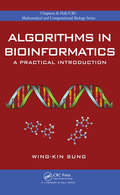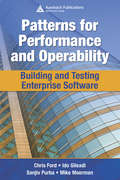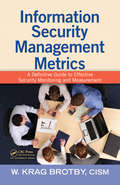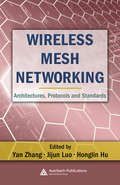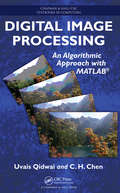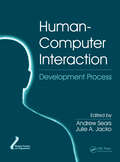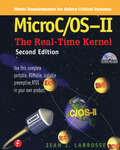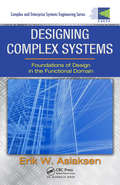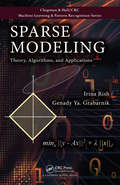- Table View
- List View
Simple Statistical Methods for Software Engineering: Data and Patterns
by C. Ravindranath Pandian Murali KumarAlthough there are countless books on statistics, few are dedicated to the application of statistical methods to software engineering. Simple Statistical Methods for Software Engineering: Data and Patterns fills that void. Instead of delving into overly complex statistics, the book details simpler solutions that are just as effective and connect wi
Automated Physical Database Design and Tuning (Emerging Directions in Database Systems and Applications)
by Nicolas BrunoDue to the increasing complexity in application workloads and query engines, database administrators are turning to automated tuning tools that systematically explore the space of physical design alternatives. A critical element of such tuning is physical database design since the choice of physical structures has a significant impact on the perfor
Multimedia Content Encryption: Techniques and Applications
by Shiguo LianThe widespread use of image, audio, and video data makes media content protection increasingly necessary and urgent. For maximum safety, it is no longer sufficient to merely control access rights. In order to fully protect multimedia data from piracy or unauthorized use, it must be secured through encryption prior to its transmission or distributio
The Privacy Papers: Managing Technology, Consumer, Employee and Legislative Actions (ISSN)
by Rebecca HeroldToday, more than ever, organizations have to cope with increased concerns regarding privacy issues. These concerns are not limited to consumer fears about how information collected by Web sites will be used or misused. They also involve broader issues, including data collected for direct response marketing, privacy of financial and health records,
Using the Common Criteria for IT Security Evaluation
by Debra S. HerrmannMany organizations and government agencies require the use of Common Criteria certified products and systems and use the Common Criteria methodology in their acquisition process. In fact, in July 2002 the U.S. National Information Assurance Acquisition Policy (NSTISSP #11) mandated the use of CC evaluated IT security products in critical infrastruc
Dynamic Software Development: Managing Projects in Flux
by Timothy WellsThe ever changing nature of information makes the job of managing software development notoriously difficult. Dynamic Software Development: Managing Projects in Flux eases the burden by defining the principles, practices, skills, and techniques needed to manage a dynamic development environment. At a hands-on level, the text helps managers define t
Securing and Controlling Cisco Routers
by Peter T. DavisSecuring and Controlling Cisco Routers demonstrates proven techniques for strengthening network security. The book begins with an introduction to Cisco technology and the TCP/IP protocol suite. Subsequent chapters cover subjects such as routing, routing protocols, IP addressing, and Cisco Authentication, Authorization, and Accounting services (AAA)
A Guide to MATLAB Object-Oriented Programming
by Andy H. RegisterA Guide to MATLAB Object-Oriented Programming is the first book to deliver broad coverage of the documented and undocumented object-oriented features of MATLAB. Unlike the typical approach of other resources, this guide explains why each feature is important, demonstrates how each feature is used, and promotes an understanding of
Relational Data Clustering: Models, Algorithms, and Applications
by Philip S. Yu Zhongfei Zhang Bo LongA culmination of the authors' years of extensive research on this topic, Relational Data Clustering: Models, Algorithms, and Applications addresses the fundamentals and applications of relational data clustering. It describes theoretic models and algorithms and, through examples, shows how to apply these models and algorithms to solve real-world problems.After defining the field, the book introduces different types of model formulations for relational data clustering, presents various algorithms for the corresponding models, and demonstrates applications of the models and algorithms through extensive experimental results. The authors cover six topics of relational data clustering:Clustering on bi-type heterogeneous relational dataMulti-type heterogeneous relational data Homogeneous relational data clusteringClustering on the most general case of relational dataIndividual relational clustering frameworkRecent research on evolutionary clusteringThis book focuses on both practical algorithm derivation and theoretical framework construction for relational data clustering. It provides a complete, self-contained introduction to advances in the field.
Introduction to Concurrency in Programming Languages
by Matthew J. Sottile Timothy G. Mattson Craig E RasmussenIllustrating the effect of concurrency on programs written in familiar languages, this text focuses on novel language abstractions that truly bring concurrency into the language and aid analysis and compilation tools in generating efficient, correct programs. It also explains the complexity involved in taking advantage of concurrency with regard to program correctness and performance. The book describes the historical development of current programming languages and the common threads that exist among them. It also contains several chapters on design patterns for parallel programming and includes quick reference guides to OpenMP, Erlang, and Cilk. Ancillary materials are available on the book's website.
Computational and Visualization Techniques for Structural Bioinformatics Using Chimera (Chapman & Hall/CRC Computational Biology Series)
by Forbes J. BurkowskiA Step-by-Step Guide to Describing Biomolecular StructureComputational and Visualization Techniques for Structural Bioinformatics Using Chimera shows how to perform computations with Python scripts in the Chimera environment. It focuses on the three core areas needed to study structural bioinformatics: biochemistry, mathematics, and computation.Und
Circular and Linear Regression: Fitting Circles and Lines by Least Squares (Chapman & Hall/CRC Monographs on Statistics and Applied Probability)
by Nikolai ChernovFind the right algorithm for your image processing applicationExploring the recent achievements that have occurred since the mid-1990s, Circular and Linear Regression: Fitting Circles and Lines by Least Squares explains how to use modern algorithms to fit geometric contours (circles and circular arcs) to observed data in image processing and comput
Interpreting the CMMI (R): A Process Improvement Approach, Second Edition
by Margaret K. Kulpa Kent A. JohnsonTaking a broad approach that speaks to experienced and inexperienced process improvement practitioners, CMMI experts and CMMI novices, this second edition thoroughly examines the latest version of the CMMI. Divided into six sections, the text first clarifies the concept of process improvement, makes the case for how and why to employ CMMI, and outlines its structure. It then provides an overview of the process areas, supported by real-world display tables, templates, and charts designed to aid organizations in their improvement efforts. Subsequent sections address measurement issues including basic metrics, statistical process control, and high maturity concerns, as well as SCAMPISM appraisal types.
The ABCs of IP Addressing
by Gilbert HeldOur world is rapidly becoming an Internet-based world, with tens of millions of homes, millions of businesses, and within a short period of time, possibly hundreds of millions of mobile professionals accessing the literal mother of all networks. One of the key problems affecting many Internet users, ranging from individual professionals to networki
Group Theoretic Cryptography (Chapman & Hall/CRC Cryptography and Network Security Series)
by Maria Isabel Gonzalez Vasco Rainer SteinwandtGroup theory appears to be a promising source of hard computational problems for deploying new cryptographic constructions. This reference focuses on the specifics of using groups, including in particular non-Abelian groups, in the field of cryptography. It provides an introduction to cryptography with emphasis on the group theoretic perspective, making it one of the first books to use this approach. The authors provide the needed cryptographic and group theoretic concepts, full proofs of essential theorems, and formal security evaluations of the cryptographic schemes presented. They also provide references for further reading and exercises at the end of each chapter.
Managing Global Development Risk
by Steven E. Hall James M. HusseyWhile global sourcing has expanded dramatically in terms of activities, consistent challenges remain for organizations that choose such a business decision. These challenges include maximizing the opportunity afforded by globalization, fully realizing potential gains, and managing the risks inherent to global development. In addition, while companies continue to start or expand their use of global resources, little is being done to help project managers, business analysts, architects, and others succeed in this new environment. Built upon real-world experiences, Managing Global Development Risk provides the tools, techniques, and knowledge necessary to achieve project success with offshore resources. By reading and utilizing the templates within this book, you will acquire: Knowledge of project management principles and their application, Understanding of software development processes and their application , Insight into the diverse personalities within your global development team and the appropriate management and communications style to achieve success. Awareness of cultural issues and mannerisms that will enhance your ability to guide your team To fully realize the benefits of global development, a proper mix of local and offshore resources is essential. This book is an important tool that can help you gain the necessary competency and expand your skills in this critical area.
Algorithms in Bioinformatics: A Practical Introduction (Chapman & Hall/CRC Computational Biology Series)
by Wing-Kin SungThoroughly Describes Biological Applications, Computational Problems, and Various Algorithmic Solutions Developed from the author's own teaching material, Algorithms in Bioinformatics: A Practical Introduction provides an in-depth introduction to the algorithmic techniques applied in bioinformatics. For each topic, the author clearly details the bi
Patterns for Performance and Operability: Building and Testing Enterprise Software
by Chris Ford Ido Gileadi Sanjiv Purba Mike MoermanApplications that work perfectly in controlled settings often fail in production environments, impacting business operations. This book explores a frequently overlooked aspect of software development: non-functional design and testing. In the real world, hostile production conditions and changing business usage can lead to unforeseen downtime or unacceptable system performance. Written by technologists and based on real field experience, the book examines common failure scenarios, defensive design patterns, and effective performance strategies.
Information Security Management Metrics: A Definitive Guide to Effective Security Monitoring and Measurement
by CISM, W. BrotbySpectacular security failures continue to dominate the headlines despite huge increases in security budgets and ever-more draconian regulations. The 20/20 hindsight of audits is no longer an effective solution to security weaknesses, and the necessity for real-time strategic metrics has never been more critical. Information Security Management Metr
Wireless Mesh Networking: Architectures, Protocols and Standards (Wireless Networks and Mobile Communications)
by Yan Zhang Honglin Hu Jijun LuoA promising new technology, wireless mesh networks are playing an increasingly important role in the future generations of wireless mobile networks. Characterized by dynamic self-organization, self-configuration, and self-healing to enable quick deployment, easy maintenance, low cost, high scalability, and reliable services, this technology is beco
Digital Image Processing: An Algorithmic Approach with MATLAB (Chapman & Hall/CRC Textbooks in Computing)
by Uvais Qidwai C.H. ChenAvoiding heavy mathematics and lengthy programming details, Digital Image Processing: An Algorithmic Approach with MATLAB presents an easy methodology for learning the fundamentals of image processing. The book applies the algorithms using MATLAB, without bogging down students with syntactical and debugging issues.One chapter can typically be compl
Human-Computer Interaction: Development Process (Human Factors and Ergonomics)
by Julie A. Jacko Andrew SearsHailed on first publication as a compendium of foundational principles and cutting-edge research, The Human-Computer Interaction Handbook has become the gold standard reference in this field. Derived from select chapters of this groundbreaking resource, Human-Computer Interaction: The Development Practice addresses requirements specification, desig
MicroC/OS-II: The Real Time Kernel
by Jean LabrosseMicroC/OS II Second Edition describes the design and implementation of the MicroC/OS-II real-time operating system (RTOS). In addition to its value as a reference to the kernel, it is an extremely detailed and highly readable design study particularly useful to the embedded systems student. While documenting the design and implementation of the kernel, the book also walks the reader through the many related development issues: how to adapt the kernel for a new microprocessor, how to install the kernel, and how to structure the applications that run on the kernel. This edition features documentation for several important new features of the software, including new real-time services, floating points, and coding conventions. The accompanying downloadable resources include complete code for the MicroC/OS-II kernel.
Designing Complex Systems: Foundations of Design in the Functional Domain (Complex and Enterprise Systems Engineering)
by Erik W. AslaksenWithout standardized construction elements such as nuts, bolts, bearings, beams, resistors and the like, the design of physical equipment is hopelessly inefficient, and engineers are continually bogged down with re-designing these elements over and over again. Emphasizing a top-down approach, this volume considers the purpose and basic features of design and how the concept of value can provide a quantitative measure of that wider interaction of the engineered object with its environment. This work also develops the domain in which functional design takes place and explores how the system concept can be embedded in that domain. It proposes a number of functional design elements and develops them in considerable detail, outlining how they can be applied as part of a coherent design framework. For greater understanding of the discussed concepts, numerous examples and analogies are included.
Sparse Modeling: Theory, Algorithms, and Applications (Chapman & Hall/CRC Machine Learning & Pattern Recognition)
by Irina Rish Genady GrabarnikSparse models are particularly useful in scientific applications, such as biomarker discovery in genetic or neuroimaging data, where the interpretability of a predictive model is essential. Sparsity can also dramatically improve the cost efficiency of signal processing.Sparse Modeling: Theory, Algorithms, and Applications provides an introduction t
